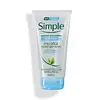Simple Skincare Water Boost Micellar Cleansing Facial Gel Wash Versus Ellana Mineral Cosmetics Flower Power Powder Face Cleanser
What's inside
What's inside
 Key Ingredients
Key Ingredients

 Benefits
Benefits

 Concerns
Concerns

 Ingredients Side-by-side
Ingredients Side-by-side

Water
Skin ConditioningCocamidopropyl Betaine
CleansingPropylene Glycol
HumectantHydroxypropyl Methylcellulose
Emulsion StabilisingSodium Chloride
MaskingPanthenol
Skin ConditioningCitric Acid
BufferingDisodium EDTA
Glycerin
HumectantHydroxypropyl Cyclodextrin
MaskingIodopropynyl Butylcarbamate
PreservativePantolactone
HumectantPhenoxyethanol
PreservativePotassium Chloride
Saccharide Isomerate
HumectantSodium Citrate
BufferingSodium Hydroxide
BufferingTocopheryl Acetate
AntioxidantWater, Cocamidopropyl Betaine, Propylene Glycol, Hydroxypropyl Methylcellulose, Sodium Chloride, Panthenol, Citric Acid, Disodium EDTA, Glycerin, Hydroxypropyl Cyclodextrin, Iodopropynyl Butylcarbamate, Pantolactone, Phenoxyethanol, Potassium Chloride, Saccharide Isomerate, Sodium Citrate, Sodium Hydroxide, Tocopheryl Acetate
 Reviews
Reviews

Ingredients Explained
These ingredients are found in both products.
Ingredients higher up in an ingredient list are typically present in a larger amount.
Citric Acid is an alpha hydroxy acid (AHA) naturally found in citrus fruits like oranges, lemons, and limes.
Like other AHAs, citric acid can exfoliate skin by breaking down the bonds that hold dead skin cells together. This helps reveal smoother and brighter skin underneath.
However, this exfoliating effect only happens at high concentrations (20%) which can be hard to find in cosmetic products.
Due to this, citric acid is usually included in small amounts as a pH adjuster. This helps keep products slightly more acidic and compatible with skin's natural pH.
In skincare formulas, citric acid can:
While it can provide some skin benefits, research shows lactic acid and glycolic acid are generally more effective and less irritating exfoliants.
Most citric acid used in skincare today is made by fermenting sugars (usually from molasses). This synthetic version is identical to the natural citrus form but easier to stabilize and use in formulations.
Read more about some other popular AHA's here:
Learn more about Citric Acid